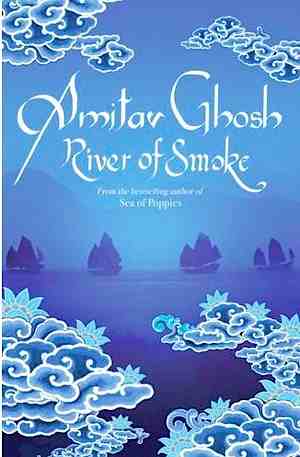River of Smoke by Amitav Ghosh

Without a doubt, the most important news stories of the last decade have been geopolitical and economic. Even the recession, notwithstanding its clear domestic roots, is related to our involvement in the Middle East and Asia. The war on terror, immigration, the-world-is-flat pronouncements: phenomena like these are all part and parcel, we’re told, of a new era—one not without its birth pangs—called globalization.
These entanglements, while they assume forms and scales never before seen, all have precedents. It should come as no surprise that historical fiction might be an especially apt mode for understanding issues of our day. River of Smoke, the second book in Amitav Ghosh’s Ibis trilogy, ably continues a series that is easily one of the most inspired explorations of global encounters by a 21st-century writer.
Set a year before the First Opium War, the story focuses on the Eastern trade at a time when revolutions (market and industrial) were newly underway in the West. In particular, the novels restore the role of India and the Indian Ocean to the largely forgotten story of the opium trade. Played out primarily in China and dominated by Britain, the enterprise involved a host of other countries, including our own fledgling republic, and scores of migrants the world over.
The Ibis trilogy—named after the ship that sets the entire story into motion—is not relevant simply because of India and China’s recent reemergence as economic powerhouses. In fact, the themes the trilogy situates (and holds to scrutiny) in this chapter of history make the works fascinating and truly notable.
In the first book, Sea of Poppies, what comes through Ghosh’s story most clearly is cosmopolitanism, best illustrated by an unparalleled richness of language. Striving for accuracy and reveling in the wordplay, Ghosh mingles several Indian tongues with the Anglo-Indian diction of the ruling class. If that were not enough, he simulates Laskari, the lingua franca of oceangoing sailors known as lascars. These are, after all, seafaring novels, and as much as Ghosh is subverting a form closely associated with imperial writers like Conrad and Kipling, he’s also paying homage to the worldliness of Moby Dick.
Ghosh, a native of India, spent his childhood all over Asia. An Oxford-trained anthropologist, he’s intimately familiar with the study of cultures and personally acquainted with the exchanges among disparate peoples. Ghosh has long divided his time between the U.S. and India, and now in his mid 50s, he’s pronounced the Ibis trilogy his life’s project. It seems, at first glance, that he’s taken quite the departure from previous work. (Missing is the fiercely postmodern style that characterized earlier novels.) But his concerns—an engagement with history and colonialism, the shifting of borders (and memory), and the gathering of knowledge—as well the politics, remain much the same.
Several characters share the narrative spotlight in Sea of Poppies. We have Deeti, the widow of an opium addict and the driving force behind much of the action. We get Paulette and Jodu, the French and Bengali orphans, respectively, who had been raised like siblings. There’s Neel, an effete young landowner whose fortune hinges precariously on the opium trade. And there’s Zachary Reid, an American mulatto working his way up the Ibis’ ranks.
Through a complex series of bold decisions and many twists of fate, this group invariably ends up on an ill-fated journey from Calcutta to Mauritius. To say that melodrama, betrayal, second chances, villainy and hijinks ensue is to acknowledge that, for all its linguistic fireworks, the first novel’s plot comes as something of a potboiler. The joy in the novel lies in its intricate crafting and meticulous research. It certainly makes for a gratifying, if challenging, read.
While Ghosh punctuates the constant unfolding of events in Sea of Poppies with many signs of ill portent, River of Smoke proceeds at a far slower pace. Readers will notice that Ghosh chooses not to directly continue the plot from the first book, which ends on quite the cliffhanger, but charts a more circuitous route. Uncertainties surrounding the characters’ futures resolve only partially, and over time. Moreover, the Ibis’ most familiar faces recede into the background for much of the novel. Deeti, the chief protagonist in Sea of Poppies, gets her due in a lyrical, nonlinear first chapter. Replacing her is Bahramji Naurozji Modi, a Parsi businessman from Western India who stands at the center of River of Smoke.
Through the book’s many lengthy and meandering disquisitions on the opium trade, botany and art, Ghosh sustains an ominous tone, even after climactic events. The book moves slowly, if anxiously, and in this way the novel’s structure mimics the flow of traffic on the Pearl River at the port of Canton, the setting (and namesake) for most of River of Smoke. It’s the fall of 1838. The Chinese emperor has newly enforced the longstanding (and long-ignored) ban on opium. The situation in Fanqui-town, the foreigners’ enclave, grows volatile.
With trade at a standstill, Bahram has much time to reflect on his life and career. He entered the business in his early twenties, becoming one of the most successful Indian opium traders. He’d originally hoped simply to prove himself to his in-laws—and perhaps gain some distance from them—but the opium trade has offered him far more than that, providing glimpses of the life he has always wanted. A shrewd businessman, Bahram typically comes out ahead in spite of risks, but when the narrative finds him, he has put everything on the line at this particularly tenuous, inauspicious moment. As an Indian, Bahram finds himself caught between East and West in more ways than one, and his position provides a unique vantage point to the various conflicts brewing in Canton.
-

-

-

-

-

-

-

-

-

-

-

-

-

-

-

-

-

-

-

-

-

-

-

-

-

-

-

-

-

-

-

-

-

-

-

-

-

-

-

-








































